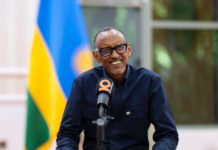Ambassador Rice should re-read the Group of Experts report on the situation in the Congo and begin to “feel the heat” of her inaction.
(WASHINGTON DC) – Susan Rice, the current U.S. Ambassador to the U.N has been the target of a media and twitter frenzy calling on her to take swift and concise action in Central Africa by imposing sanctions on the Rwandan Government for backing M23 rebel group that is currently terrorizing Eastern Congo in both weaponry and military orders. Yet, she has remained silent. Much as she did in 1994 in President Bill Clinton’s administration. Rice was quoted making unsavory comments to the French Envoy to the UN about the DRC which have left a bad taste in the mouths of many concerned political analysts.
Much of this heat on Ambassador Rice comes as Secretary of State Hillary Clinton prepares to leave her post amidst the rumors that Rice will soon replace her under President Obama’s appointment. But her actions, or lack thereof, in regards to central Africa beg the question “is she qualified?” As well as the much deeper question, “will her personal relationship with President Paul Kagame of Rwanda affect her ability to hold him accountable,” as it already seems to be?
Ambassador Rice’s connection to President Kagame has a very long history since the end of the Rwandan Genocide in 1994. She expressed regret for her inaction then by stating, “I swore to myself that if I ever faced such a crisis again, I would come down on the side of dramatic action, going down in flames if that was required.” Yet, Ambassador Rice’s words have come back to haunt her. Over 6 million people have perished violently in the Congo in the last 17 years and countless women have been raped and Rice remains “unburned.” Seems she has not lived up to her promise to “go down in flames if required.”
Rice has a long history of supporting Paul Kagame in various ways. From the Clinton administration on the National Security Council and as Assistant Secretary of State for African Affairs during President Bill Clinton’s second term. Further, “Rice was managing director and principal at Intellibridge from 2001 to 2002. In 2002, she joined the Brookings Institution as senior fellow in the Foreign Policy program. At Brookings, she focused on U.S. foreign policy, weak and failing states, the implications of global poverty, and transnational threats to security” (Wikipedia.)
Dr. Theogene Rudasingwa stated to this reporter in regards to Ambassador Susan Rice’s relationship with Rwanda and Kagame that: “For sure we paid Intellibridge $650,000 USD while I was Chief of Staff at the Presidency. The authorization was given by President Kagame and effected by Donald Kaberuka who was then Minister of Finance. I did discuss this matter in Kigali with Gayle Smith, a colleague of Susan Rice. We doubted the usefulness of services they said they were offering but Kagame said it was a deliberate favor he was extending to Susan Rice, Gayle Smith and Anthony Lake for their friendship. Gayle Smith now works at Obama’s White House. Anthony Lake now heads UNICEF.” Dr. Rudasingwa further stated that, “They were supposed to get us a computerized information system to give us global data, information and a situation analysis on matters of Rwanda’s national interest.” This reporter asked if the system was delivered and the response from Dr. Rudasingwa was, “So called, was never used and died natural death.”
Another former high level Rwandan official stated to this reporter, “Somehow, I did not interact with Susan. We all used to regard her ‘friend of Rwanda’, little did we know, she was Kagame’s friend and Rwandans did not matter to her. Anyway, the way Kagame snubbed her last time she visited Kigali, I thought she had known him or learnt a lesson. What continued to motivate her thereafter, no idea.”
Rwanda 1994
In a 2001 article in The Atlantic entitled “Bystanders to Genocide” President Bill Clinton is quoted as saying, “According to several advisers, toward the end of his term of office Clinton himself snapped at members of his foreign-policy team, angry with them for notsteering him toward a moral course. He is said to have convinced himself that if he had known more, he would have done more. In his 1998 remarks in Kigali he pledged to “strengthen our ability to prevent, and if necessary to stop, genocide.” “Never again,” he declared, “must we be shy in the face of evidence.”” Yet despite the overwhelming evidence of Rwanda’s involvement in the Congo the US has remained suspiciously silent.
As a Senator, President Barack Obama authored one of the strongest and most specific policies on the DR Congo. In PL. 109-456 Sec. 105 Obama specified that any country found to be conclusively destabilizing the DR Congo could be sanction up to and including having their foreign aid withheld. What more proof does the President require? Fifteen years of reports have all stated the same things and have provided empirical evidence of Rwanda continuously and unrelentingly committing war and crimes against humanity in the Congo and yet President Paul Kagame has gone untouched.
DR Congo
Despite the UN Group of Experts reports, Human Rights Watch Reports, Amnesty International, UNICEF and other high profile organization who have all clearly voiced concerns for the people in Central Africa and the effect President Paul Kagame has had on the region since seizing power in Rwanda in 1994 the United Nations does not seem to be listening. The UK has listened as well as Sweden, Belgium, India, and, in small part, the US and all have cut most if not all of their foreign aid to Rwanda for backing a violent rebel group destabilizing Eastern Congo. But why has the US not taken stronger action? Why have they not named names? Why is Ambassador Rice doing all in her power to protect Paul Kagame?
In an article entitled “Why Nobody Cares about Congo” the authors powerfully states, “If Congo’s coveted mineral resources can still be brought out to manufacture valued consumer goods without risky intervention, then there’s no need to do much more than the periodic news coverage or occasional non-profit awareness campaign. The lack of international effort on peace-making in the Congo is not only a statement of the devaluation of African lives, but the blatant inconsistency of so-called humanitarian principles.”
Yes, minerals and money have a lot to do with this war, but not all. Kagame is one of the most conniving men in Africa having been strategically trained in psychological warfare in the US. Never underestimate his reach but he must also know that at this point many are saying that “his days are numbered.”
Final thoughts for Rice…
When I asked Dr. Rudasingwa what Ambassador Rice’s greatest strengths and weaknesses have been in regards to Central Africa he replied with this statement, “Protecting Kagame in his actions in Rwanda and DRC are her worst actions. She did help Rwanda’s post genocide recovery.”
There are a few things Ambassador Susan Rice should make note of; for example she should not mistake perceived stability for national freedom. Rice should know that when leaders take control of a country by the gun they are rarely hero’s or people to be held up on a pedestal. If one comes into power through mass killings they typically have to stay in power using the same strategy. Further, Rice should know that when a country is being strangled by their leader they are not allowed to tell anyone or they will also find themselves on the barrel of that gun. If politicians, journalists, and anyone daring to speak up in the face of impunity have to flee in the night to live in another country it is not because they fear freedom. It is because they fear death. One has only to look into Rwanda’s prisons to find where all of the opposition members are. Most importantly Ambassador Rice should understand the basic principal of decision making, the most obvious answer to a problem is usually the right one.
Ambassador Rice should re-read the Group of Experts report on the situation in the Congo and begin to “feel the heat” of her inaction.
Jennifer Fierberg





























































